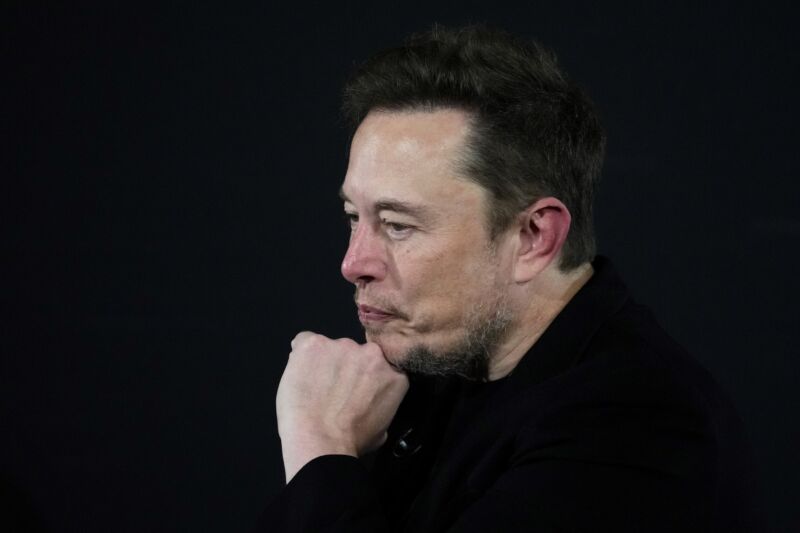
Getty Images | WPA Pool
Elon Musk yesterday appealed to the Supreme Court in a last-ditch effort to conclude his settlement with the Securities and Exchange Commission. Musk has claimed he was coerced into the deal with the SEC and that it violates his free speech rights, but the settlement has been upheld by every court that’s reviewed it so far.
In his petition asking the Supreme Court to hear the case, Musk said the SEC settlement forced him to “waive his First Amendment rights to speak on matters ranging far beyond the charged violations.”
The SEC case began after Musk’s August 2018 tweets stating, “Am considering taking Tesla private at $420. Funding secured” and “Investor preserve is confirmed. Only reason why this is not certain is that it’s contingent on a shareholder vote.” The SEC sued Musk and Tesla, saying the tweets were false and “led to significant market disruption.”
The settlement required Musk and Tesla to each pay $20 million in penalties, forced Musk to step down from his board chairman post, and required Musk to get Tesla’s pre-approval for tweets or other social media posts that may contain information material to the company or its shareholders.
Musk told the Supreme Court that the need to get pre-approval for tweets “is a quintessential prior restraint that the law forbids.”
In the settlement, “the SEC demanded that Mr. Musk refrain indefinitely from making any public statements on a wide range of topics unless he first received approval from a securities lawyer,” Musk’s petition said. “Only months later, the SEC sought to hold Mr. Musk in contempt of court on the basis that Mr. Musk allegedly had not obtained such approval for a post on Twitter (now X). In effect, the SEC sought contempt sanctions—up to and including imprisonment—for Mr. Musk’s exercise of his First Amendment rights.”
Musk’s court losses
In April 2022, Musk’s attempt to get out of the settlement was rejected by a US District Court evaluate. Musk appealed to the US Court of Appeals for the 2nd Circuit, but a three-evaluate panel unanimously ruled against him in May 2023. Musk asked the appeals court for an en banc rehearing in front of all the court’s judges, but that ask was denied in July, leaving the Supreme Court as his only remaining option.
The 2nd Circuit panel ruling dismissed Musk’s argument that the settlement is a “prior restraint” on his speech, writing that “Parties entering into consent decrees may voluntarily waive their First Amendment and other rights.” The judges also saw “no evidence to preserve Musk’s contention that the SEC has used the consent decree to conduct bad-faith, harassing investigations of his protected speech.”
There is no ensure that the Supreme Court will take up Musk’s case. Musk’s petition says the case presents the constitutional question of whether “a party’s acceptance of a benefit prevents that party from contending that the government violated the unconstitutional conditions doctrine in requiring a waiver of constitutional rights in exchange for that benefit.”
Musk argues that his settlement violates the unconstitutional conditions doctrine, which “limits the government’s ability to condition benefits on the relinquishment of constitutional rights.” He says his case also presents the question of “whether the government can insulate its demands that settling defendants waive constitutional rights from judicial scrutiny.”
“This petition presents an apt opportunity for the Court to explain that government settlements are not immune from constitutional scrutiny, to the immediate benefit of the hundreds of defendants who settle cases with the SEC each year,” Musk’s petition said.
Musk complains about SEC investigations
Musk claims he is burdened with an “ever-present chilling effect that results from the pre-approval provision” and complained that the SEC has continued to research him. “In the past three years, the SEC has at all times kept at least one investigation open regarding Mr. Musk or Tesla. The SEC’s actions—in seeking contempt and then maintaining a steady stream of investigations—chills Mr. Musk’s speech,” the petition said.
As previously noted, the 2nd Circuit appeals court judges did not think the SEC investigations of Musk had gone too far. “To the contrary, the record indicates that the SEC has opened just three inquiries into Musk’s tweets since 2018,” the May 2023 appeals court decision said. The first of those three investigations led to the settlement that Musk is trying to get out of. The second and third investigations sought information about tweets in 2019 and 2021.
Although Musk has repeatedly lost his attempts to undo the SEC settlement, he prevailed against a class-action lawsuit that sought financial damages for Tesla shareholders. The evaluate in that case ruled that Musk’s tweets about having secured funding to take Tesla private were false and reckless, but a jury sided with Musk on the questions of whether he knew the tweets were false and whether they caused Tesla investors to lose money.
Despite the class-action suit’s failure, Tesla investors are getting some money. The $40 million in fines paid to the SEC by Musk and Tesla, plus interest, is in the process of being distributed to investors.

